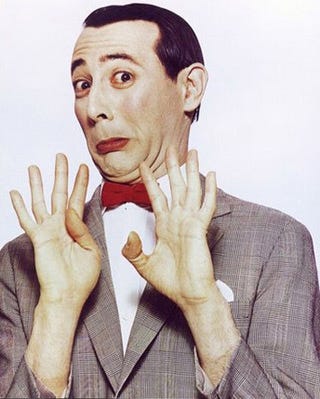The Burton Binge: "Pee-wee's Big Adventure"
Each Sunday with "The Burton Binge," Sam Watermeier will look back at one of Tim Burton's films, ultimately tracing the return to the auteur's roots with the October 5 release of "Frankenweenie," an animated adaptation of Burton's first live-action short film.
From the fringes of suburbia to the furthest reaches of space, all of Tim Burton's films follow outsiders. And the one who carved the path for them all was none other than this guy ...

Burton made his feature-length debut in 1985 with "Pee-wee's Big Adventure." Although comedian Paul Reubens created the title character, Pee-wee embodies a fitting evolutionary leap for Burton — a progression from the kind of quiet, reserved boy explored in "Vincent" and "Frankenweenie" to one who wears strangeness on his sleeve.
Donning a gray suit, red bow tie and Silly Putty smile, Pee-wee is a funhouse reflection of an Apatowian man-child. He's also a perfect conduit for Burton's imagination — a colorful burst of energy that commands attention, the very embodiment of a directorial debut.
Pee-wee's introduction is not unlike Burton's — a bold, swift identification as an outsider, and a dare for the audience to join him.
What's so amusing about the film is the innocence of the journey that follows — a quest for Pee-wee's lost bike. While it is a silly mission to adult viewers, Burton, along with Reubens and co-writers Phil Hartman and Michael Varhol, shows keen understanding that, to a child, a lost bike is as urgent as life and death.
The whole film is filled with the kind of melodramatic heft only found in a child's imagination. When Pee-wee discovers his bike stolen, the film buzzes with a palpable, surreal sense of panic, which is as much a credit to Reubens' vivacious performance and Danny Elfman's score as it is to Burton's direction.
In regards to Burton's stamp, this is his most Pollock-esque effort. You can sense him experimenting and splattering paint on the canvas rather than trying to say something — a fact made evident by the film's flashy visual style in which all the characters appear to be drowning in color.
Aside from the occassional dark moments of circus-like dread, the movie is easily Burton's brightest, bounciest film and one of the few in which a happy ending seems truly inevitable. However, that's not to say it is a crowd-pleaser.
"Big Adventure" is more of an acquired taste than almost any of Burton's subsequent films. It's loud and brash, probably appealing more to music-blasting rascals than run-of-the-mill moviegoers. In that sense, it is successful, as ideal art comforts the disturbed and disturbs the comfortable.
Speaking of disturbing the comfortable, next week I'll discuss Burton's rural family poltergeist comedy, "Beetlejuice" — a film whose titular character is as dangerous as Pee-wee is childish.


